Key Takeaways from the Microsoft AI Tour 2025
Key Takeaways from the Microsoft AI Tour 2025
March 18th, 2025
10 min read
On the 5th March 2025, some of the Pragmatiq team attended the Microsoft AI Tour at the London ExCeL. This was a brilliant opportunity to connect with industry leaders, technology specialists and the Microsoft community to explore the latest advancements in AI. The energy throughout the day was brilliant and it was so exciting to hear about the impact that AI tools, like Microsoft Copilot Studio, are already having for organisations, but also the huge potential moving forward.
Our Managing Director, Stuart, Technology & Innovation Director, Nick, and Marketing Manager, Jessica, attended several inspiring sessions throughout the day. Below, we’ve pulled together our key takeaways for a round-up.
AI for Non-Profits
We work heavily in the charity and non-profit space at Pragmatiq, so we were keen to understand more about the value of AI for this sector. We’re already having some interesting conversations with some of our clients about the role of AI, and we also recently hosted a webinar on Transforming Non-Profit Operations with Microsoft Copilot Studio. Nonetheless, it was great to hear what the Tech for Social Impact team had to say in this session.
Three key areas were highlighted that AI can support with:
- Automation and streamlining processes: AI can handle repetitive, time-consuming tasks, freeing up teams to focus on high-impact work. From automating data entry to streamlining donor communications, AI helps organisations work smarter.
- Increasing community response rates: By leveraging AI-driven tools, nonprofits can enhance engagement and communication. AI enables faster, more personalised responses to service users and supporters, strengthening relationships and increasing satisfaction.
- Driving innovation: AI encourages a culture of innovation, empowering nonprofits to explore new strategies and solutions that scale their impact and support their mission.
What was interesting, but came as no surprise, were the barriers to AI adoption in non-profit organisations:
- 65% are concerned about data privacy and security.
- 53.5% cite a lack of AI skills and feel they need more training.
- 49.5% say they lack clear use cases, struggling to see exactly where AI can add the most value.
As real as these barriers are, they can all be overcome through the right support and training.
Copilot and AI Agents in Charities
After exploring the barriers to AI adoption, we then explored the future of Copilot and AI agents in charities, hearing about the potential for this innovative technology. To summarise:
Copilot (M365 Copilot):
- A personalised, secure digital assistant that streamlines day-to-day tasks, surfaces insights and helps individuals work more efficiently.
AI Agents (Microsoft Copilot Studio):
- Expert systems designed to complete tasks on behalf of teams. They can be triggered by people (via tools like Copilot) or automatically (e.g., when an email is received). There is a spectrum of agents:
- Task-based agents: Follow predefined rules.
- Autonomous agents: Plan and execute tasks independently, making decisions without human input – a huge opportunity for the sector.
In the future, it is thought that most organisational processes will be supported by AI agents, creating significant opportunities for nonprofits to scale and innovate. AI is here to stay, and with the right approach, it can help nonprofits amplify their impact and drive meaningful change.
Jessica Sheridan, Marketing Manager at Pragmatiq
Master agentic AI in your organisation
Another session we attended was a panel talk, about mastering agentic AI in your organisation. There were several key takeaways from this session:
- The pace of change is unmatched
AI adoption is accelerating faster than any previous technology shift. Although it might seem like every single organisation around is using it, the majority are still determining where the biggest benefits will emerge – whether that’s improving the bottom line, enhancing customer experience, or increasing internal efficiencies.
- Adoption is the biggest challenge
Similar to what we heard in the non-profit session, AI adoption across commercial organisations is equally as prevalent. Successful AI adoption goes beyond rolling out technology; it requires driving a cultural shift. It’s about embedding AI into workflows, shifting mindsets, and focusing on value-driven outcomes. Then when you’ve got the foundations in place, you can start to build out from there.
Upskilling, knowledge sharing, and change management are essential skills to adopt as part of this process and remember that success takes time and consistent effort – it doesn’t happen overnight.
- Balancing innovation and impact
Across many organisations, employees are eager and often already experimenting with AI for personal productivity (think ChatGPT or Microsoft Copilot Chat). If you can find a way to channel this enthusiasm into initiatives that also drive business value, then you are moving in the right direction.
A good place to start is by analysing your business processes, consider questions like “Does this process need AI?” and “What are we trying to achieve?” and “Where are the biggest pain points in current workflows?”. If you move through your processes asking these things, you will soon find yourself with a (hopefully) more manageable list of where you can start with your AI journey that seems less overwhelming than trying to tackle everything.
- Where’s the value?
While many early AI use cases are customer-facing, the largest growth opportunities often lie in back-office and middle-office operations. Automating these areas can unlock significant efficiencies and drive long-term value. Work with teams in these areas to identify the pain points they are feeling and bring them on the journey of how AI could improve these areas – they will ultimately be the ones directly impacted by the changes.
And lastly, remember that competitive advantage doesn’t come from having AI – it comes from how effectively it’s applied. Working with experts can help guide you through this transition and ensure you are adopting AI most effectively.
Stuart Goldwater, Managing Director at Pragmatiq
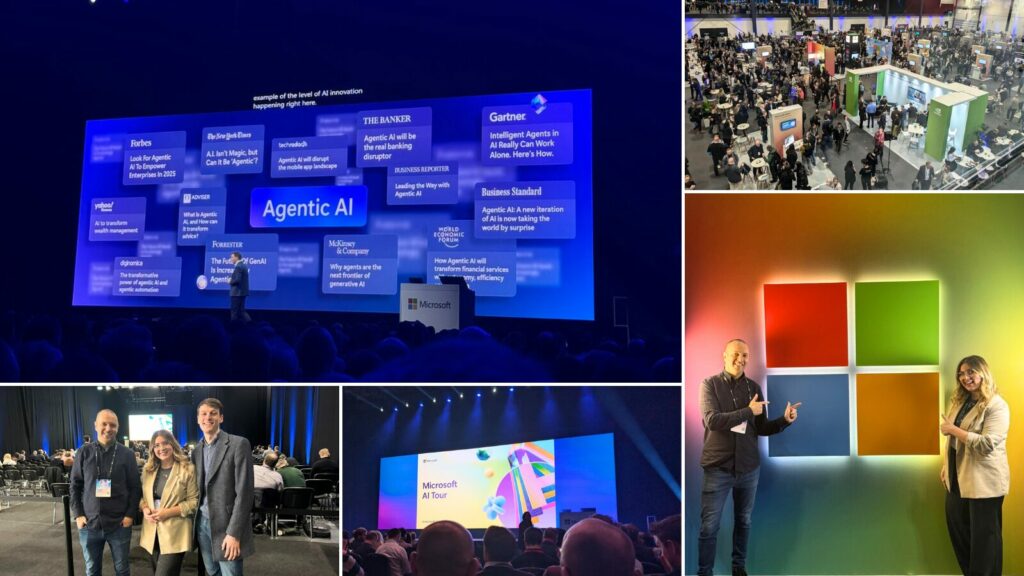
Power Platform: Accelerating innovation in the age of AI
Another talk we attended was all about the Power Platform and AI. Now you might be thinking, the Power Platform isn’t a new thing, and you’re right, it’s been around for several years now and here at Pragmatiq, it plays a strong role in most of our projects. What made this talk particularly interesting was the perspective shared by Rueben Krippner, Director of Power Platform at Microsoft. He highlighted that while AI has been part of the Power Platform for some time, the introduction of Copilot capabilities takes the platform to new heights, offering even more potential for innovation and functionality.
To give some background on the Power Platform:
- Traditional business systems are designed to solve specific, known problems through a structured approach: gather requirements, write a spec, and build a solution. The Power Platform enables organisations to address infinite unknowns, empowering agility to tackle unexpected challenges and seize new opportunities. Through the suite of tools, the possibilities of what you can build and the problems you can solve are endless.
- There are 48 million monthly active users on Power Platform worldwide, demonstrating the scale.
- It accelerates deployment speed and enables organisations to adapt faster than ever.
- Microsoft has been investing in AI across Power Platform for years. The shift now is towards autonomous agents, moving beyond simple task automation to comprehensive organisational support.
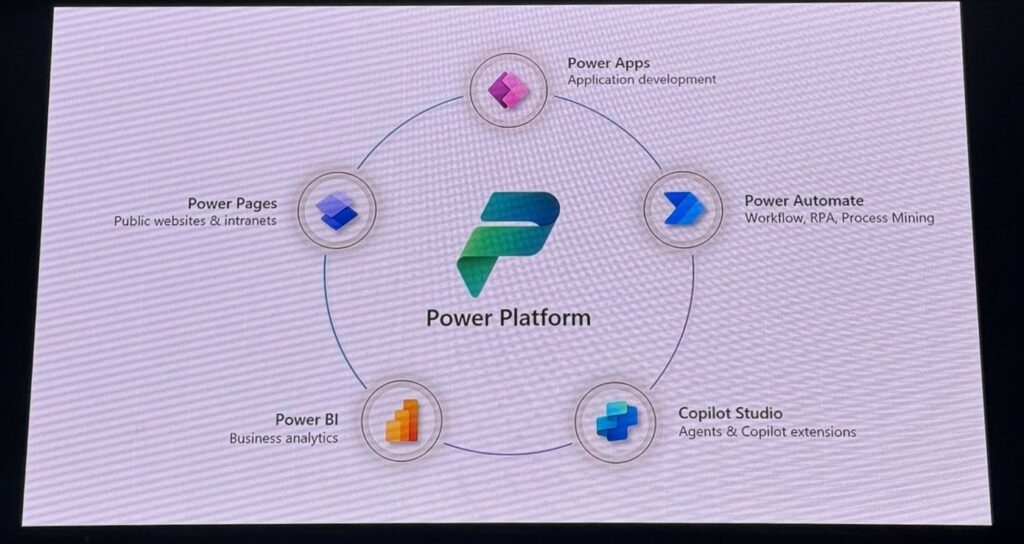
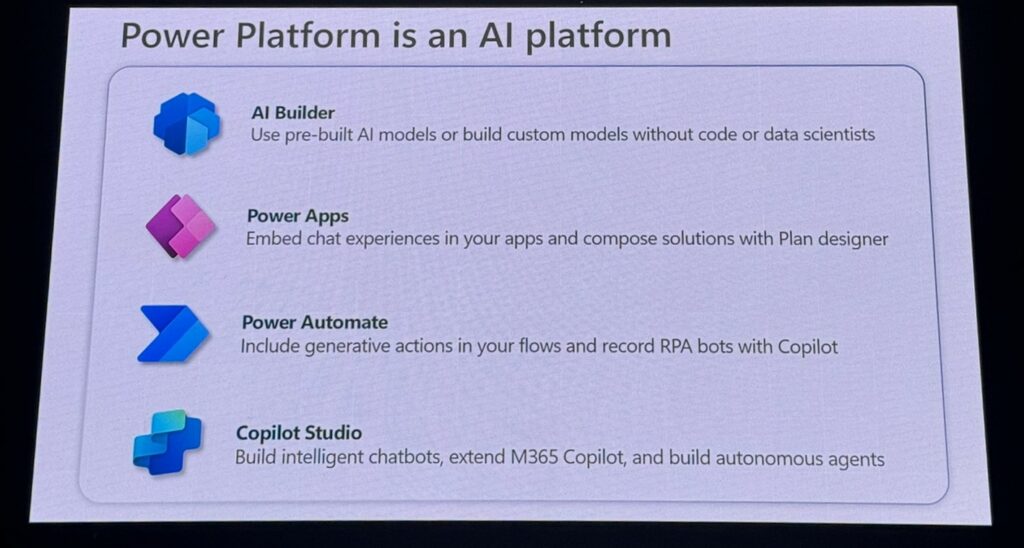
From personal productivity to organisational agents
This is more than individual Copilots helping with tasks; Agents are expanding the AI opportunity. Of course, the personal productivity agent will remain and be of use, but we’re now seeing a shift on an organisational level to have a wider benefit.
This means we will go beyond basic commands (do this + the copilot acts), to a more autonomous approach with agents able to be triggered in multiple ways, as demonstrated by the slide image below. It will operate like a team, each agent with distinct roles and responsibilities, working collaboratively and driving processes forward with minimal intervention. Essentially, it will act like a human; it has a job description, it knows where to get the knowledge and it can take action independently. If we consider the business value, this reduces single points of ownership and ultimately alleviates risks and challenges that come with this.
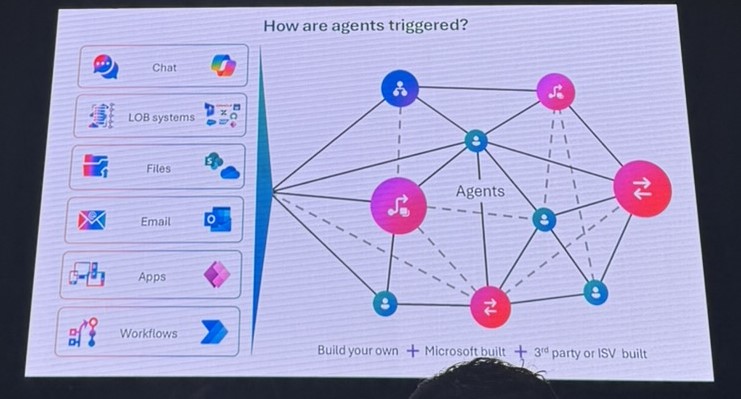
Ultimately, this is about enabling humans to do higher-value work, not to replace them. The synergy of people, processes, and technology is where the true value lies, and how we can use the toolset we have to get the best outcomes.
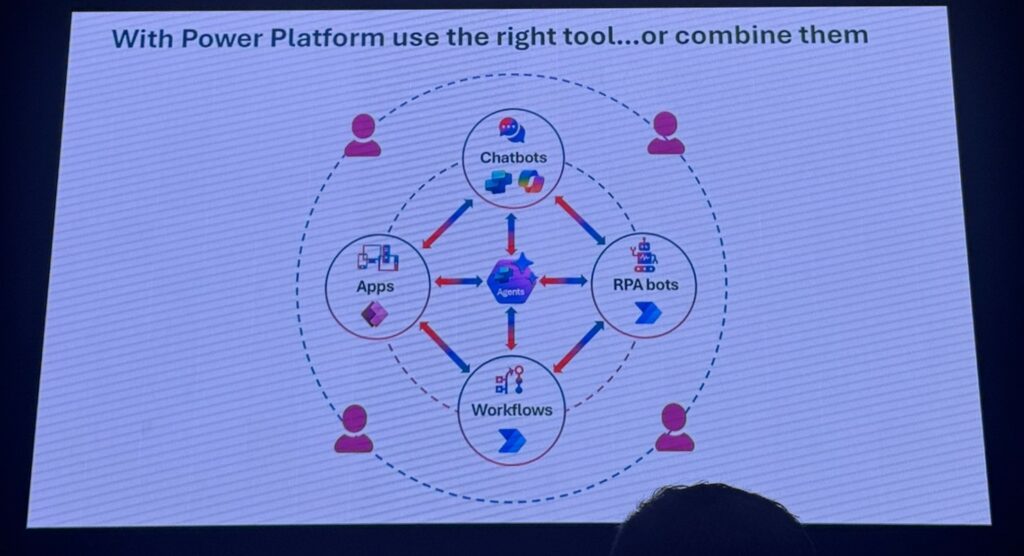
Copilot Studio vs. Azure AI Agents
In a different session, we gained deeper insights into Azure AI Agents, an area less spoken about at the moment in comparison to Copilot Studio.
- Copilot Studio simplifies straightforward tasks such as content creation, document retrieval, and data summarization. It offers efficient and reliable outcomes for basic processes.
- Azure AI Agents: When business needs require deeper customisation and flexibility, Azure AI Agents provide a more powerful solution. Key benefits include:
- Access to Advanced Models: Utilising the latest large language models for complex tasks.
- Enhanced Control: Offering granular management over how models are customised, refined and insights on performance.
- Bespoke Outputs: Tailoring results to meet specific business objectives and contexts.
- Contextual Understanding:Delivering deeper insights through advanced contextual awareness.
- Azure AI Agents are ideal for handling complex AI interactions, bespoke requirements, and scenarios demanding greater autonomy and adaptability.
The choice between Copilot Studio and Azure AI Agents depends on the complexity of tasks and the level of control required.
As organisations continue to integrate AI into their operations, understanding the strengths and applications of each tool is crucial.
Addressing AI Compliance and Security
Common concerns around AI adoption include data security, regulatory compliance, and the risk of data leaks or oversharing. It was reassuring to hear how Microsoft is proactively addressing these issues by providing robust tools and frameworks to ensure:
- AI solutions are secure, compliant, and resilient against common threats.
- Data access is correctly managed to prevent oversharing or unauthorised access.
- Rollouts are carefully designed to align with security best practices and regulatory standards.
Nick Metcalfe, Technology & Innovation Director at Pragmatiq
Need support on your AI journey?
As highlighted in this summary, a lot of valuable content was covered throughout the day, and we’re excited to keep exploring the potential of these technologies. If your organisation is looking for a Microsoft Partner to support you on your AI journey, feel free to reach out to Pragmatiq for an exploratory conversation. Contact us today at info@pragmatiq.co.uk or call 01908 038110.